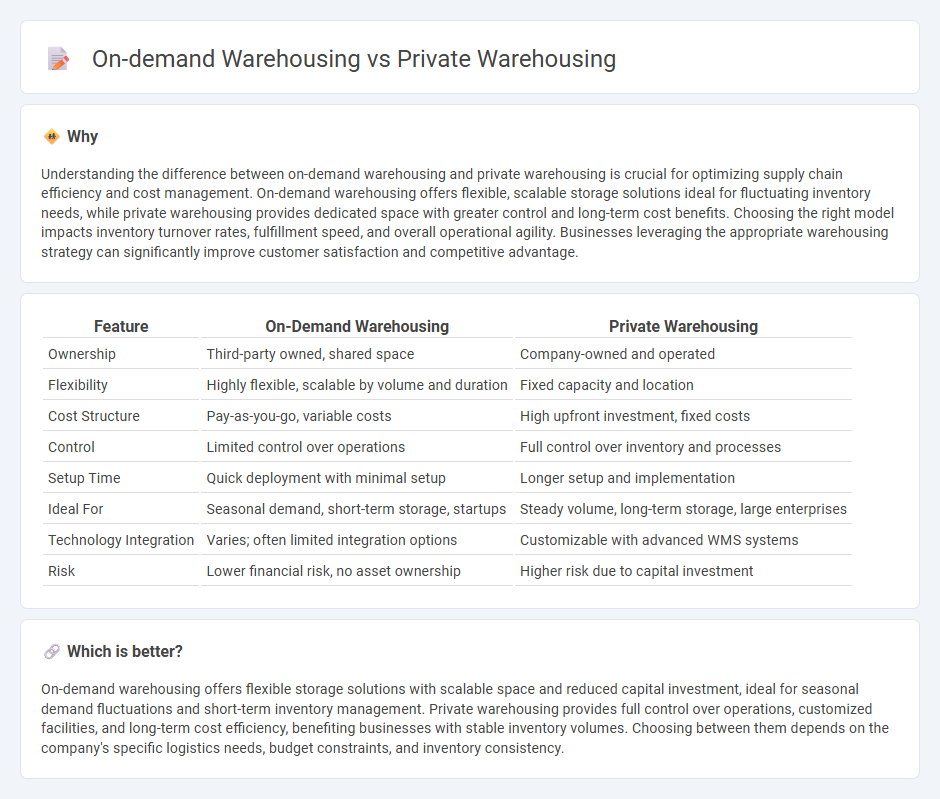
On-demand warehousing offers flexible, scalable storage solutions by leveraging shared spaces based on real-time needs, contrasting with private warehousing's dedicated facilities tailored for long-term inventory control. This model reduces overhead costs and enables businesses to adapt quickly to fluctuating demand cycles and seasonal inventory changes. Explore the benefits and trade-offs of on-demand versus private warehousing to optimize your supply chain strategy.
Why it is important
Understanding the difference between on-demand warehousing and private warehousing is crucial for optimizing supply chain efficiency and cost management. On-demand warehousing offers flexible, scalable storage solutions ideal for fluctuating inventory needs, while private warehousing provides dedicated space with greater control and long-term cost benefits. Choosing the right model impacts inventory turnover rates, fulfillment speed, and overall operational agility. Businesses leveraging the appropriate warehousing strategy can significantly improve customer satisfaction and competitive advantage.
Comparison Table
| Feature | On-Demand Warehousing | Private Warehousing |
|---|---|---|
| Ownership | Third-party owned, shared space | Company-owned and operated |
| Flexibility | Highly flexible, scalable by volume and duration | Fixed capacity and location |
| Cost Structure | Pay-as-you-go, variable costs | High upfront investment, fixed costs |
| Control | Limited control over operations | Full control over inventory and processes |
| Setup Time | Quick deployment with minimal setup | Longer setup and implementation |
| Ideal For | Seasonal demand, short-term storage, startups | Steady volume, long-term storage, large enterprises |
| Technology Integration | Varies; often limited integration options | Customizable with advanced WMS systems |
| Risk | Lower financial risk, no asset ownership | Higher risk due to capital investment |
Which is better?
On-demand warehousing offers flexible storage solutions with scalable space and reduced capital investment, ideal for seasonal demand fluctuations and short-term inventory management. Private warehousing provides full control over operations, customized facilities, and long-term cost efficiency, benefiting businesses with stable inventory volumes. Choosing between them depends on the company's specific logistics needs, budget constraints, and inventory consistency.
Connection
On-demand warehousing and private warehousing both optimize inventory management by providing flexible storage solutions tailored to business needs. On-demand warehousing offers scalable, short-term space rentals ideal for seasonal demand spikes, while private warehousing ensures dedicated, long-term storage controlled directly by the company. Integrating these approaches enables businesses to enhance supply chain efficiency, reduce costs, and maintain inventory responsiveness.
Key Terms
Ownership
Private warehousing involves ownership and long-term control of storage facilities by a single company, ensuring dedicated space and tailored operations. On-demand warehousing offers flexible access to shared storage networks without ownership, adapting quickly to fluctuating inventory needs and reducing fixed costs. Explore detailed comparisons to determine which warehousing model aligns best with your business strategy.
Flexibility
Private warehousing offers long-term storage solutions with fixed costs and control over inventory management, whereas on-demand warehousing provides scalable space that adjusts to fluctuating business needs without long-term commitments. Flexibility in on-demand warehousing supports seasonal surges and market variability by enabling quick access to diverse locations and customizable storage options. Explore more about how warehousing flexibility can optimize supply chain efficiency for your business.
Cost structure
Private warehousing involves fixed costs such as facility rent, equipment maintenance, and salaried staff, resulting in higher upfront investments but lower variable costs over time. On-demand warehousing offers flexible pricing models with pay-as-you-go rates based on space usage and duration, minimizing capital expenditure but potentially increasing per-unit storage costs during peak demand. Explore detailed cost comparisons to determine which warehousing strategy aligns best with your business needs.
Source and External Links
Private, Public, or Contract: Which Warehousing Type is Right for You? - Private warehousing is when a business owns or fully controls a warehouse to independently manage inventory, customize logistics processes, and maintain day-to-day operational control without outside approval, ideal for businesses wanting full control and flexibility over their storage and fulfillment operations.
Exploring the Impact of Private Warehousing on Business Logistics - Private warehousing benefits businesses with high inventory turnover, seasonal sales surges, or special storage needs by offering dedicated space, custom workflow designs, real-time inventory control, specialized zones like climate control, and consistent staffing for better logistics management.
Private Warehouse: Benefits, Challenges, and Who Should Use Them - A private warehouse is a company-owned storage facility allowing full customization, improved security, branding opportunities, and control over inventory management, making it suitable for enterprises needing efficient inventory handling and reduced transportation costs.
 dowidth.com
dowidth.com